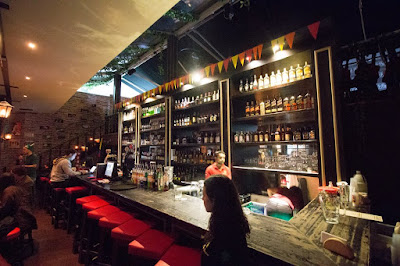'When all is said and done, a lot more is said than done.' It's very difficult to argue against that one. As a species, we're good at talking a good talk, but we don't always follow it up with the appropriate action if and when required.
Alongside 'said' in the opening saying, we can add 'written' (yes, this coming from a blogger and all). The legal world is quite adept at that. The old adage of 'less is more' seems anathema to it. It likes to make things that should be pretty straightforward to comprehend – and act upon – come across as if they were written by somebody not of this world.
Yet, some languages – specifically Spanish (Colombian Spanish, anyway) in this case – are more culpable than others in this regard, and it's not exclusive to the legal sphere.
A common observation among those who translate Spanish to English here in Colombia is that the former is overly and unnecessarily wordy.
 |
| You could just leave it at EU, lads ... (Image from elgranporque.com) |
Yet, some languages – specifically Spanish (Colombian Spanish, anyway) in this case – are more culpable than others in this regard, and it's not exclusive to the legal sphere.
A common observation among those who translate Spanish to English here in Colombia is that the former is overly and unnecessarily wordy.
Indeed, it can be quite the head-scratcher to figure out what's being said. This tends to be worse if someone has made a literal translation of his/her Spanish into English and asks you to proofread.
Of course, it's not always best practice to directly translate from one language to another, each one has its peculiarities, but what we're getting at here is what seems to be the same thing said a number of times, just in different ways. Plus, a lot of the time it's written in ridiculously long sentences devoid of punctuation.
In reference to the revised peace agreement between the Colombian government and Farc guerrillas, Britain's Guardian newspaper, inadvertently perhaps, touched on this: "Although the text of the new agreement was not immediately published, the president, Juan Manuel Santos, laid out certain changes in a televised speech. Some are little more than clarifications of the often-vague language of the text. Other modifications are more substantial."
For those who have had to work with Spanish texts before, that 'often-vague language' is something that will resonate.
Of course, it's not always best practice to directly translate from one language to another, each one has its peculiarities, but what we're getting at here is what seems to be the same thing said a number of times, just in different ways. Plus, a lot of the time it's written in ridiculously long sentences devoid of punctuation.
In reference to the revised peace agreement between the Colombian government and Farc guerrillas, Britain's Guardian newspaper, inadvertently perhaps, touched on this: "Although the text of the new agreement was not immediately published, the president, Juan Manuel Santos, laid out certain changes in a televised speech. Some are little more than clarifications of the often-vague language of the text. Other modifications are more substantial."
For those who have had to work with Spanish texts before, that 'often-vague language' is something that will resonate.
In legal and political contexts, as happens with other languages, it might be deliberate: leave things open to as many interpretations as possible. A reason, perhaps, why the Colombian constitution is quite lengthy. However, Spanish seems to bring this verbose approach to every sphere.
On a more trivial note, take abbreviations, where there is a doubling up on letters in some cases. For example, the United States (US), ' Estados Unidos' in Spanish, is written 'EEUU' in the abbreviated form. 'Fuerzas Militares' (literally 'Military Forces') abbreviates as 'FFMM'. (It's to do with plural terms, although it's not done in all cases.) Think about ink costs when printing these things out, guys!
Going slightly off-topic, football commentators in these parts are masters at making an uneventful football match seem as if it's the most exciting thing ever, spluttering out a thousand words a minute. The Simpsons did a good take on this years ago (back when The Simpsons was enjoyable).
There are a lot of things to like about the (Colombian) Spanish language and culture. It just seems that at times it could do with a bit of streamlining.
On a more trivial note, take abbreviations, where there is a doubling up on letters in some cases. For example, the United States (US), ' Estados Unidos' in Spanish, is written 'EEUU' in the abbreviated form. 'Fuerzas Militares' (literally 'Military Forces') abbreviates as 'FFMM'. (It's to do with plural terms, although it's not done in all cases.) Think about ink costs when printing these things out, guys!
Going slightly off-topic, football commentators in these parts are masters at making an uneventful football match seem as if it's the most exciting thing ever, spluttering out a thousand words a minute. The Simpsons did a good take on this years ago (back when The Simpsons was enjoyable).
There are a lot of things to like about the (Colombian) Spanish language and culture. It just seems that at times it could do with a bit of streamlining.
There might be more than one way to write the same thing, but you don't need to put them all down at the same time.
______________________________________
Facebook: Wrong Way Corrigan - The Blog & IQuiz "The Bogotá Pub Quiz".
______________________________________
Facebook: Wrong Way Corrigan - The Blog & IQuiz "The Bogotá Pub Quiz".

















